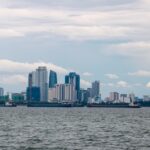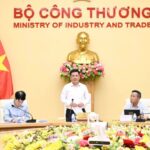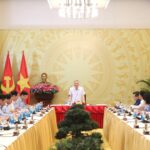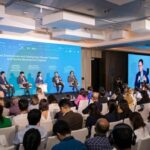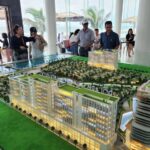Speaking at the Finance and Real Estate Forum on May 8, Mr. Lim Dyi Chang, Director of UOB Vietnam’s Corporate Customer Group, shared that global supply chains are not formed randomly but based on the natural competitive advantages of each country. Labor-intensive industries requiring low costs, general skills, and large-scale production, such as footwear and consumer electronics, are no longer a good fit for the US labor environment and expenses.
“Do we really expect a large American to sit and sew clothes or assemble iPhones? That’s beyond their advantage,” he said.
UOB’s expert argued that protectionist policies like tariffs can only shift trade flows in the short term. In the long run, the global trend will still favor economies with efficient production capabilities and competitive costs, such as Vietnam and other ASEAN countries.
Mr. Lim also pointed out that global brands like Apple and Nike, who truly hold the power to determine production chains, will not accept any risks affecting sales and profits. When costs rise due to tax policies, both suppliers and American consumers will be put in a difficult position.
From a business perspective, Mr. Lim opined that the impacts of trade policies will gradually be adjusted according to market demands and global profit pressures. Therefore, supply chains will continue to seek markets like Vietnam, which boasts a plentiful workforce, reasonable costs, and an improving investment climate.
Sharing this view, Mr. Truong An Duong, Executive Director of Industrial and Residential Real Estate at Frasers Property Vietnam, believed that the US would continue to focus on high value-added sectors like technology, finance, or content production, while large-scale manufacturing would remain in Asia. “The US will still produce movies, and Bac Giang or Bac Ninh will still assemble phones,” he illustrated.
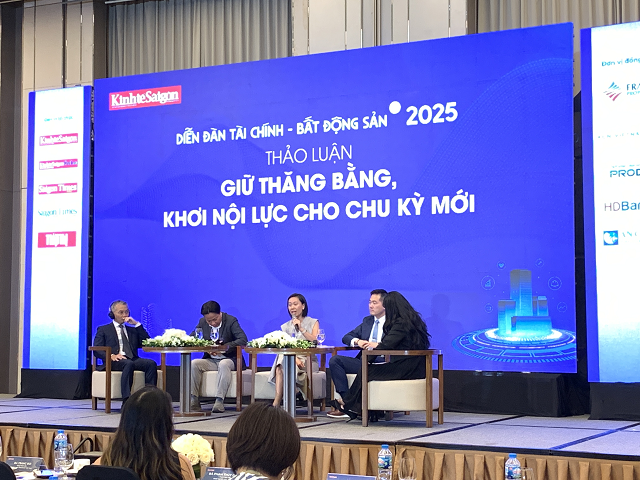
The speakers shared at the event on the morning of May 8. Photo: Tu Kinh
|
Foreign Industrial Real Estate Businesses Want to Continue Investing in Vietnam
At the forum, Mr. Truong An Duong shared that Frasers Property remains committed to long-term investment in Vietnam despite the uncertainties in the international trade environment, especially the new tax policies from the US.
Over the past four years, Frasers Property has developed industrial real estate in Binh Duong, Bac Ninh, Hung Yen, and Quang Ninh provinces, with a total floor area of nearly 500,000m2, mainly serving foreign investors. He shared that in the first week after the US announced its new tax policy, there were 5-7 affected customers. Some temporarily halted land lease contracts, while others withdrew from investment plans. However, surprisingly, the number of new investors contacting them during this time was higher than usual.
He attributed this to two parallel trends: one side is cautious about the risks, while the other sees opportunities to shift production or expand investments in Vietnam. After two weeks, the market sentiment stabilized. Frasers Property considered this an opportunity to reevaluate its customer portfolio and adjust its strategic direction.
Mr. Duong noted that the impact of tariffs is not only direct but also indirect on factories that do not export to the US but have parent companies in the US or use raw materials from China. When input costs rise, businesses have to adjust their production models and investment plans.
While being cautious in the short term, Frasers Property maintains its expansion strategy in Vietnam in the medium and long term. Mr. Duong shared that the company is monitoring the market situation weekly and will carefully consider any new investment decisions in the next 2-3 months. Simultaneously, the company is adjusting its investment attraction strategy, prioritizing industries less dependent on the US market, such as consumer electronics, semiconductors, data centers, and home appliances—areas aligned with Vietnam’s high-tech orientation.
With its international network, Frasers Property aims to expand its global customer reach and optimize its investment efficiency by leveraging its existing land bank. Mr. Duong affirmed that the US’s increased taxes force industrial real estate developers to be more flexible in their market orientation. However, Vietnam still holds a significant advantage in Southeast Asia—a region considered the global growth epicenter in the coming decades—thanks to its young workforce, competitive costs, and strategic location.
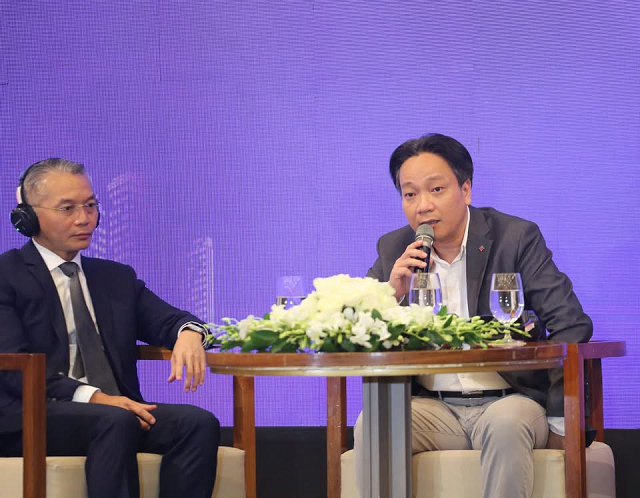 Mr. Truong An Duong (right) and Mr. Lim Dyi Chang. Source: Saigon Economics Online
|
Danang Explores Sea Reclamation and Floating Island Construction
“On May 10th, the People’s Committee of Danang City established a task force to explore the idea of reclaiming land from the sea in Danang Bay. This ambitious project aims to expand the city’s boundaries and create new opportunities for development.”
Crafting a Compelling Copy: “Empowering Vietnamese Enterprises: Navigating the American Marketplace”
“Industry leaders from prominent businesses and corporations are gearing up for an eventful period ahead. From now until June, they plan to actively engage and collaborate with American partners to bring signed agreements and memorandums to life. This proactive approach underscores their commitment to fostering meaningful relationships and turning visions into tangible outcomes.”
The ESG Vietnam Investment Conference 2025: Navigating Sustainable Development in a Dynamic Global Landscape.
The Vietnam ESG Investment Conference 2025, co-organized by Raise Partners and Vietnam Innovators Digest, is set to take place at the New World Saigon Hotel in Ho Chi Minh City on May 13-14, 2025. With the theme “Sustainability and Growth in a Dynamic Age,” the conference, now in its third iteration, is expected to serve as a pivotal platform for discussions and collaborations on environmental, social, and governance (ESG) investment strategies in Vietnam.


